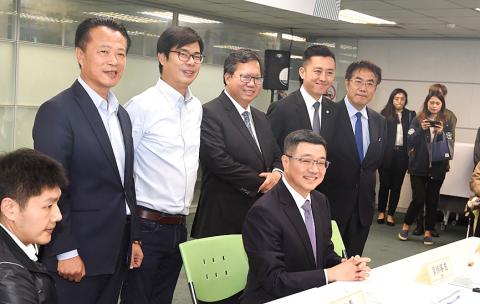Executive Yuan Secretary-General Cho Jung-tai (卓榮泰) yesterday registered as a candidate in the Democratic Progressive Party (DPP) chairperson election after being nominated by a group of “middle generation” party members.
The group, led by Taoyuan Mayor Cheng Wen-tsan (鄭文燦), on Thursday put forward Cho’s name, saying that they would accompany him yesterday afternoon to register as a candidate at the DPP’s headquarters in Taipei.
Cho would be competing with former DPP secretary-general Michael You (游盈隆) and former Kaohsiung County deputy commissioner Kuo Tai-ling (郭泰麟) for leadership of the party.

Photo: Liu Hsin-de, Taipei Times
The group that nominated Cho includes Hsinchu Mayor Lin Chih-chien (林智堅), Chiayi County commissioner-elect Weng Chang-liang (翁章梁), former legislator Chen Chi-mai (陳其邁), outgoing Taichung Mayor Lin Chia-lung (林佳龍), Tainan mayor-elect Huang Wei-che (黃偉哲) and Pingtung County Commissioner Pan Men-an (潘孟安).
Cho completed the registration accompanied by some members of the group.
Speaking to reporters afterward, Cho said that the question facing the DPP is not what kind of chairperson it needs, but what kind of ruling party the nation needs.
A dominant party has emerged in Taiwan — it is known as the “Hate the Democratic Progressive Party Party,” Cho said.
He vowed to visit the party’s “haters” and “have a talk” with them about the DPP’s problems, saying that he would show them the party is undergoing changes and would convince them it was true.
Cho said that if elected, he would lead the DPP to become a more honest, pragmatic and down-to-earth party with a mission to serve the public, adding that he would also strive to promote unity within the party.
“The DPP has a promise to Taiwanese to fulfill. Put simply, we must introduce the right policies to give people better lives,” Cho said.
He had told Premier William Lai (賴清德) about his bid for DPP chairman, Cho said, adding that he would focus on the new role if elected and would not double as Executive Yuan secretary-general.
Asked what motivated him to run, Cho turned to look at Cheng and other supporters who were standing behind him and said: “Look at their determined faces. How could I refuse?”
Cho, who has served in several government posts and was a legislator from 1999 to 2004, is seen as a “big brother” of the younger generation, Cheng said.
President Tsai Ing-wen (蔡英文) on Nov. 24 resigned as the party’s leader after the DPP suffered heavy losses in the nine-in-one elections.
Since then, there have been calls from within the party for younger leadership.
In the local elections, the DPP won only six of the nation’s 22 mayoral and commissioner seats, while the Chinese Nationalist Party (KMT) took 15.

DAREDEVIL: Honnold said it had always been a dream of his to climb Taipei 101, while a Netflix producer said the skyscraper was ‘a real icon of this country’ US climber Alex Honnold yesterday took on Taiwan’s tallest building, becoming the first person to scale Taipei 101 without a rope, harness or safety net. Hundreds of spectators gathered at the base of the 101-story skyscraper to watch Honnold, 40, embark on his daredevil feat, which was also broadcast live on Netflix. Dressed in a red T-shirt and yellow custom-made climbing shoes, Honnold swiftly moved up the southeast face of the glass and steel building. At one point, he stepped onto a platform midway up to wave down at fans and onlookers who were taking photos. People watching from inside

A Vietnamese migrant worker yesterday won NT$12 million (US$379,627) on a Lunar New Year scratch card in Kaohsiung as part of Taiwan Lottery Co’s (台灣彩券) “NT$12 Million Grand Fortune” (1200萬大吉利) game. The man was the first top-prize winner of the new game launched on Jan. 6 to mark the Lunar New Year. Three Vietnamese migrant workers visited a Taiwan Lottery shop on Xinyue Street in Kaohsiung’s Gangshan District (崗山), a store representative said. The player bought multiple tickets and, after winning nothing, held the final lottery ticket in one hand and rubbed the store’s statue of the Maitreya Buddha’s belly with the other,

‘NATO-PLUS’: ‘Our strategic partners in the Indo-Pacific are facing increasing aggression by the Chinese Communist Party,’ US Representative Rob Wittman said The US House of Representatives on Monday released its version of the Consolidated Appropriations Act, which includes US$1.15 billion to support security cooperation with Taiwan. The omnibus act, covering US$1.2 trillion of spending, allocates US$1 billion for the Taiwan Security Cooperation Initiative, as well as US$150 million for the replacement of defense articles and reimbursement of defense services provided to Taiwan. The fund allocations were based on the US National Defense Authorization Act for fiscal 2026 that was passed by the US Congress last month and authorized up to US$1 billion to the US Defense Security Cooperation Agency in support of the

‘COMMITTED TO DETERRENCE’: Washington would stand by its allies, but it can only help as much as countries help themselves, Raymond Greene said The US is committed to deterrence in the first island chain, but it should not bear the burden alone, as “freedom is not free,” American Institute in Taiwan Director Raymond Greene said in a speech at the Institute for National Defense and Security Research’s “Strengthening Resilience: Defense as the Engine of Development” seminar in Taipei yesterday. In the speech, titled “Investing Together and a Secure and Prosperous Future,” Greene highlighted the contributions of US President Donald Trump’s administration to Taiwan’s defense efforts, including the establishment of supply chains for drones and autonomous systems, offers of security assistance and the expansion of